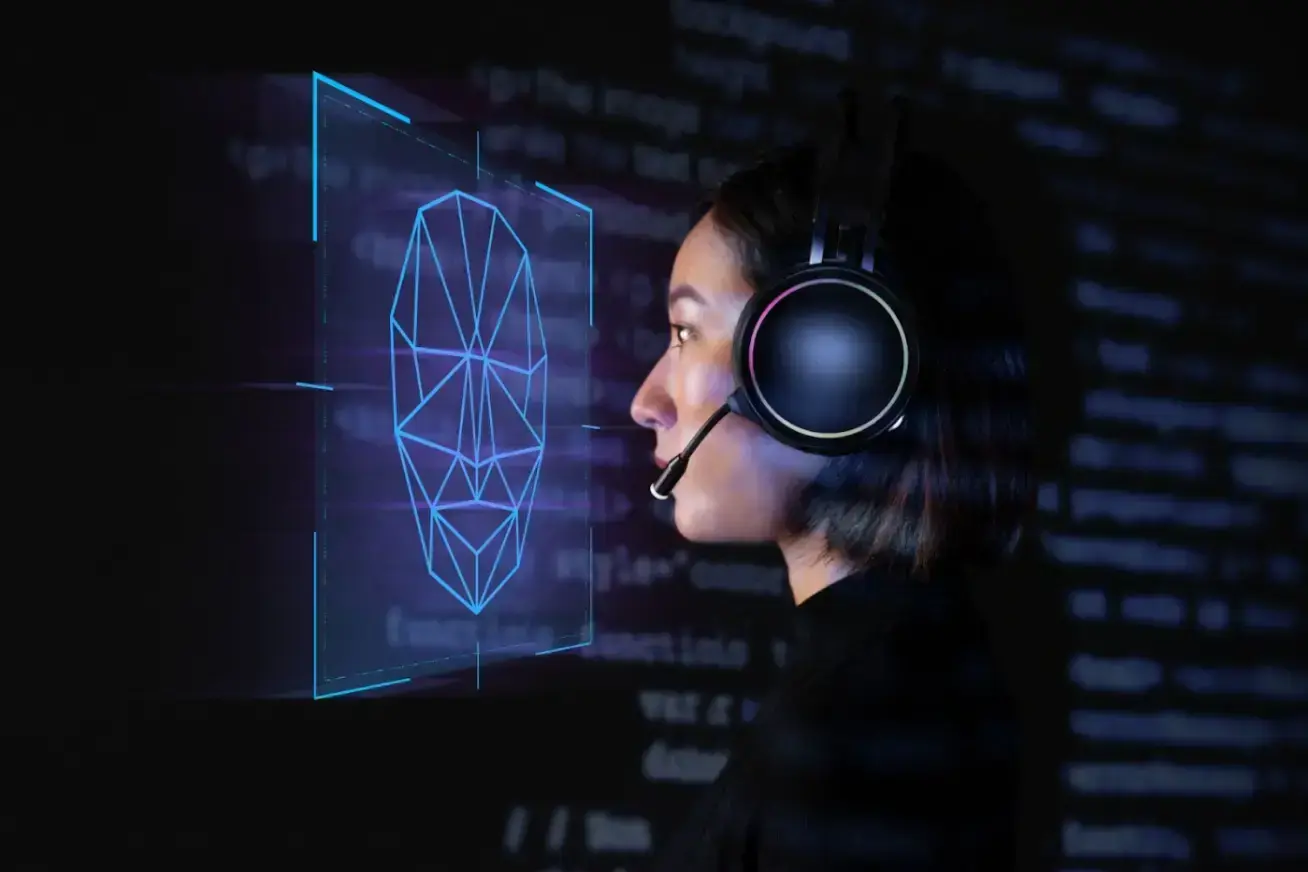AI Voice Agents, or voice bots, are advanced computer programs that employ state-of-the-art speech recognition, natural language understanding, and machine learning to mimic natural human conversation.
Advanced artificial intelligence systems work to understand voice-based communication, enable user expression, and perform multiple functions based on the input supplied.
They are online intermediaries that can communicate with people in conversational, personalized ways to enrich customer experiences, automate customer service processes, and provide strong support across multiple industries.
In this article:
- How AI Voice Agents Improve Customer Support
- Voice AI Agent Best Practices
- Benefits of Using AI Voice Agents in Communication
- Use Cases of AI Voice Agents Across Industries
- FAQs About AI Voice Agents
Conversational AI voice agents respond intelligently and independently to questions and queries, thereby creating a virtual conversation that resembles a natural one. Being able to interpret and respond to human speech enables them to address simple questions in problem-solving situations.
These voice-conversational AI agents are dynamically created, with continuous learning, and use advanced machine learning algorithms to provide accurate, timely customer support.

Source: Freepik
How AI Voice Agents Improve Customer Support
Round-the-clock presence: Offering 24/7 answering services and non-stop support with minimal human interaction, enabling enterprises to serve customer requirements around the clock.
Cross-platform interaction: Interacting with ease on different digital media like websites, mobile applications, and social networking sites to engage customers at any time and any place.
Accuracy of responses: Utilizing machine learning to enhance responses and minimize the possibility of errors.
Workforce supplementation: Allowing human customer support agents to address complex problems while AI addresses regular questions.
Training and development: AI can be used to train and support human agents, ensuring they stay up to date with the latest information and best practices.
Accessibility: Assisting in responding in different languages and formats to accommodate various customer bases and preferences.
Voice AI Agent Best Practices
In the fast-paced arena of artificial intelligence, the effectiveness of voice-based interactions is paramount. To ensure the best service and user experience, strict adherence to predefined voice AI agent best practices is required.
These practices are aimed at promoting the capabilities of conversational AI agents, building users' confidence in them, and improving the overall efficacy of voice-powered systems:

Source: Freepik
1. Clear and concise communication
The voice AI agent should deliver information in both understandable and concise formats. This involves using simple language, avoiding jargon, and providing relevant responses to user inquiries.
2. Active listening
A voice AI agent must be diligent in listening and understanding the context of customer conversations to generate accurate responses.
3. Personalization
Personalize the experience for active users, understanding their context and preferences. This makes the experience more human and enhances user interaction.
4. Ongoing learning
At intervals, keep the AI virtual bot up to date with the latest information and refresh its algorithms to adapt to changing user trends and behavior. Collaborating with an AI agent development company helps implement continuous improvements and deploy advanced AI capabilities.
5. Privacy and security
Retain user confidentiality and data protection by adhering to stringent data-handling guidelines and security policies.
6. Multi-modal interaction
Conversational AI bots can flexibly switch between text and visual modes to meet different user needs online.
7. Feedback mechanism
Create a feedback system to collate customer feedback about the performance of chatbots in resolving queries and answering questions timely.
8. Industry standards compliance
Comply with applicable industry standards and regulations to ensure the voice AI technology remains intact and trustworthy.
By adopting these Voice AI agent best practices, companies can set a benchmark in conversational AI and raise the bar in customer service.
To put these best practices into action, teams typically evaluate platforms on latency, telephony integration, speech quality, and transparent usage-based pricing; the Telnyx voice AI vs. ElevenLabs comparison highlights feature trade-offs, real-time streaming, and costs to help customer support leaders select the right voice agent stack.
Benefits of Using AI Voice Agents in Communication
The implementation of Voice Artificial Intelligence (AI) agents has become an important part of modern communication strategies with multiple benefits for businesses and individuals.
The innovative systems enhance overall interaction productivity and effectiveness, thereby delivering better customer experiences and operational efficiency.
Let us explore the key benefits of incorporating voice AI agents into modern communication frameworks:

Source: Freepik
1. Scalability
High call volumes can be handled by voice AI agents, thereby reducing the need for a large customer support staff during peak times. This saves considerable labor and infrastructure costs.
2. 24/7 availability
Human agents are not available 24/7, unlike voice AI systems, providing customers with immediate support at any time of day, similar to modern AI receptionists used by small businesses, thereby enhancing customer satisfaction and response times.
3. Uniform quality of service
Voice AI agents are trained to follow protocols and maintain a uniform tone, ensuring all interactions are professional and conform to brand standards, even in high-pressure situations.
4. Data gathering and analysis
Such systems can gather and analyze vast amounts of data from customer interactions, providing valuable insights into customer behavior and preferences. It can be used to fine-tune marketing strategies and product development.
5. Integration with current systems
Smooth integration with CRM and other enterprise systems enables a richer, more context-sensitive customer service experience, as AI can retrieve and provide real-time data based on the customer's history and preferences.
6. Improved user experience
The conversational form of voice AI agents has the potential to provide a more human-like interaction, thereby elevating customer satisfaction and loyalty. A custom AI agent can be optimized to match the brand voice, delivering a seamless, personalized experience for users.
Use Cases for AI Voice Agents Across Industries
AI voice agents have increasingly become common in customer service across multiple industries, promising numerous benefits. The subsequent examples depict the myriad uses of AI-driven voice technology in customer service:
1. Healthcare
In the healthcare sector, AI voice agents act as virtual patient assistants, reminding patients to take medication, schedule appointments, and provide symptom advice. They also help doctors with administrative tasks, allowing them to focus on important patient care.
2. Retail
AI voice agents fit the block in the retail industry to meet customer preferences, fulfill orders, answer queries, manage returns, and make promotional announcements.
3. Travel and hospitality
AI voice agents have replaced real support agents on many travel and tourism portals. The well-informed AI virtual bots help travelers with reservation details and even customize travel plans with local guidelines.
To further enhance the traveler experience, hotels are now adopting hotel guest messaging systems that allow instant communication between staff and guests. This ensures faster responses to inquiries, personalized recommendations, and seamless coordination throughout the stay, ultimately improving guest satisfaction and loyalty.
4. Education
Virtual AI assistants help the educational sector assist students with schedules, course details, registration, and more! Even administrative tasks are simplified with AI-based conversations that provide the right information to queries.
5. Automotive
Manufacturers launching new vehicles integrate AI voice agents to provide in-car support for navigation, entertainment, and emergency calls.
Even in customer care call centers, AI virtual bots are ideal for responding to service-related queries or booking service time.
Lastly, organizations and their customers benefit from the use of AI voice assistants in customer support.
Using sophisticated speech recognition and natural language processing, conversational AI solutions optimize the customer experience and operational efficiency across numerous sectors.
FAQs About AI Voice Agents
1. What are AI Voice Agents, and how do they work?
Utilizing speech recognition, natural language comprehension, and machine learning, sophisticated AI Voice Agents imitate human-like dialog. Through voice-based communication, they engage consumers, grasp questions, and promptly offer exact answers.
2. How can AI Voice Agents improve customer service?
By reducing wait times for consumers and offering personalized responses, AI Voice Agents can provide 24/7 service, manage high phone call volumes, and handle four times as many calls as a human agent. By handling common questions, they free up human agents to focus on more complex customer issues.
3. Can AI Voice Agents be customized for specific business needs?
Certainly, companies can create personalized artificial intelligence agents fitted to their sector, brand voice, and customer requirements. For a smooth customer experience, these agents can adapt to unique workflows, interface with CRM systems, and provide support in multiple languages.
4. Are AI Voice Agents secure and compliant with data privacy regulations?
AI Voice Agents adhere closely to stringent safety policies to safeguard consumer data. By following industry standards such as GDPR, HIPAA, and PCI DSS, they ensure interactions are safe and secure without jeopardizing consumer privacy.
5. What industries benefit the most from AI Voice Agents?
In healthcare, retail, banking, travel, tourism, and customer service, artificial intelligence voice agents have extensive applications. Enhanced efficiency across a range of sectors is achieved by their support of appointment scheduling, order tracking, customer inquiries, and automated troubleshooting.
Conclusion: The Future of AI Voice Agents in Customer Service
AI voice agents are rapidly reshaping how businesses interact with their customers—offering 24/7 support, reducing operational costs, and delivering personalized, human-like experiences at scale.
By combining speech recognition, natural language processing, and machine learning, these intelligent systems not only streamline customer service workflows but also elevate overall user satisfaction.
As technology continues to evolve, organizations that embrace AI voice agents will gain a competitive edge through faster response times, smarter data utilization, and scalable communication strategies.
From healthcare to retail and beyond, the impact of voice-powered AI is clear: It’s not just the future of customer service—it’s the present. Businesses that implement best practices and remain compliant with industry standards will be well-positioned to build trust and loyalty in an increasingly digital marketplace.

Author Bio
Anand Subramanian is a technology expert and AI enthusiast currently leading the marketing function at Intellectyx, a Data, Digital, and AI solutions provider with over a decade of experience working with enterprises and government departments.


